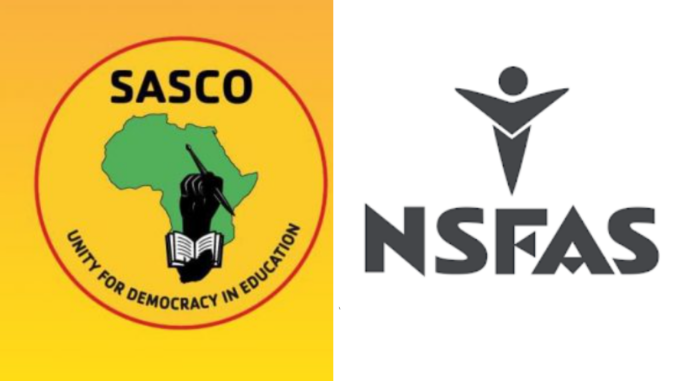
The South African Students’ Congress (SASCO) has issued a bold 30-day ultimatum demanding the immediate removal of Higher Education Minister Nobuhle Nkabane, citing what they describe as a complete failure of leadership in managing student funding and governance structures within the higher education sector.
Addressing the media at Luthuli House, SASCO President Alungile Kamtshe articulated a range of grievances that the organisation believes have caused irreparable harm to students across the country. Among their complaints is the alleged unlawful appointment of the current National Student Financial Aid Scheme (NSFAS) board. According to Section 5 of the NSFAS Act of 1999, the board must comprise at least 13 members, including three nominated by national student organisations. However, the current board only includes 12 members and lacks proper student representation, prompting SASCO to declare its composition illegitimate.
SASCO also raised alarm over the persistent delays in NSFAS allowance disbursements, saying that many students have faced lecture exclusions, evictions from residences, and even homelessness due to late payments. These challenges, they argue, represent a form of structural violence against students who rely on these funds to survive and complete their education. In addition to this, the student body claims that Minister Nkabane misled Parliament about the process for appointing the Sector Education and Training Authority (SETA) board members. They allege that she allowed politically motivated and biased selections, undermining transparency and good governance in institutions that are crucial for skills development in the country.
Another point of contention is the tragic death of a student named Sisonke at Walter Sisulu University. SASCO accuses the Minister’s office of misrepresenting the student’s status by stating she was not registered, when in fact she was. They view this as part of a broader pattern of negligence and misinformation from the Department of Higher Education and Training.
Additionally, SASCO criticised the outdated state of the Higher Education Act, which they argue has not been amended in nearly a decade despite evolving challenges in the sector. They claim that the Minister falsely presented herself as having the authority to extend student registration deadlines during a visit to the University of KwaZulu-Natal earlier this year, a move they say misled both institutions and students.
In response to these multiple concerns, SASCO has announced its intention to take legal action to challenge the current NSFAS board’s legitimacy. Should their demands remain unmet after the 30-day period, the organisation has threatened to escalate its protest efforts across the country, including potential nationwide shutdowns of university campuses.
Meanwhile, NSFAS has responded to recent concerns over payments, confirming that allowances for TVET college students were paid on 25 June 2025, with accommodation related payments completed by 27 June. Earlier in the year, NSFAS processed payments for March and April by early May, although many students reported difficulties in receiving their funds on time.
Amid confusion on social media, NSFAS also clarified that its 2025 registration portal had not been closed, attributing data submission delays to universities and colleges that missed the official March 31 deadline. The organisation reassured students that monthly disbursements are ongoing and part of a scheduled payment cycle. Despite these assurances, SASCO maintains that the underlying issues, ranging from governance failures to outdated legislation, require immediate and substantive action. Parliament’s Portfolio Committee on Higher Education is reportedly reviewing the allegations surrounding board appointments and may consider formal inquiries into the Minister’s conduct.
This unfolding dispute highlights the intense pressures faced by both students and administrators in navigating South Africa’s tertiary education landscape. For many students, the failure to access financial aid on time is not merely a bureaucratic inconvenience, it is a crisis that threatens their academic future and personal well-being.
As the countdown on SASCO’s ultimatum progresses, stakeholders across the sector will be closely watching to see whether the Minister takes decisive action, whether legal processes will be initiated, and whether student protests could once again bring institutions to a standstill.

Leave a Reply